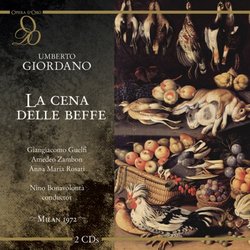Mainly for the curious but worth a listen
Ralph Moore | Bishop's Stortford, UK | 01/02/2009
(4 out of 5 stars)
"Larry Cantrell has done his customary thorough and perceptive job in reviewing this Opera d'Oro issue, so I shall add only a few words of my own.
First, the sound, while acceptable, isn't by any means as clean as it could be as it is missing the top frequencies, so it is somewhat dull and muddied, although perfectly listenable. The opera itself is muscially not as inventive, varied and interesting as, say "Siberia" (see my review) and further clarifies why Giordano never again had a hit on his hands comparable to his 1896 masterpiece "Andrea Chenier" - one of my favourite operas and the greatest opera Puccini never wrote. This is the penultimate of Giordano's fifteen operas and certainly of interest to verismo fans. It is lurid, sensational and eventful and there is a restless, febrile quality to both the music and the plot which hardly ever settles into anything melodically memorable - but there are nice love duets for both Gianotto and Ginevra in Act 2 and for Neri and Laura in Act 3. The credibility of the latter is undercut by the fact that Neri is the most unpleasant of a whole host of unpleasant characters in this over-heated opera and that Guelfi occasionally struggles with the longer, higher-lying phrases.
The singing generally is very acceptable. Zambon coud have his off-days and was a bit of a belter, but he oftens sounds uncannily like Del Monaco without quite his amplitude and allure. He and Rosati - an estimable singer of whom I have never previously heard - cap Act 2 with rousing D flats and he with a top C in Act 3.
It is hardly surprising that this opera reminds me of a superior work, "L'amore dei tre re"; they share librettos based on works by Sem Benelli, who seemed to specialise in writing material designed to titillate inter-bellum decadent tastes.
I have to say that the music improves as this short opera unfolds; there is increasingly more variety of mood with welcome interludes such as Angelo degli Innocenti's little ballad providing some let-up from the prevailingly aggressive tone, and I found myself revising my initially rather unfavourable reactions. With this kind of thing you have to suspend critical judgement and just go with it. The performances here are sufficiently committed here to allow just that - but you have to make allowances for the rather dull sound, the grotesque plot and the vulgarity of the whole enterprise. We are unlikely ever again to hear casts of the quality this opera enjoyed at its 1924 premiere at La Scala (Benvenuto Franci, Hipolito Lazaro and Carmen Melis, conducted by Toscanini) or a season later at the Metropolitan (Titta Ruffo, Beniamino Gigli, and Frances Alda, conducted by Tullio Serafin), so this cheap Opera d'Oro set will have to suffice and we shall have to be grateful for it.
"


 Track Listings (9) - Disc #1
Track Listings (9) - Disc #1